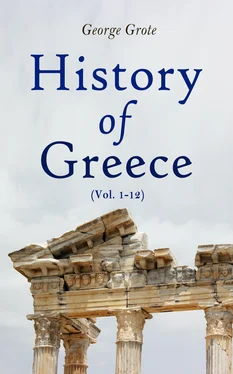Imperfectly as these two Messenian wars are known to us, we may see enough to warrant us in making two remarks. Both were tedious, protracted, and painful, showing how slowly the results of war were then gathered, and adding one additional illustration to prove how much the rapid and instantaneous conquest of Laconia and Messenia by the Dorians, which the Herakleid legend sets forth, is contradicted by historical analogy. Both were characterized by a similar defensive proceeding on the part of the Messenians,—the occupation of a mountain difficult of access, and the fortification of it for the special purpose and resistance,—Ithômê (which is said to have had already a small town upon it) in the first war, Eira in the second. It is reasonable to infer from hence, that neither their principal town Stenyklêrus, nor any other town in their country, was strongly fortified, so as to be calculated to stand a siege; that there were no walled towns among them analogous to Mykenæ and Tiryns on the eastern portion of Peloponnesus; and that, perhaps, what were called towns were, like Sparta itself, clusters of unfortified villages. The subsequent state of Helotism into which they were reduced is in consistency with this dispersed village residence during their period of freedom.
The relations of Pisa and Elis form a suitable counterpart and sequel to those of Messenia and Sparta. Unwilling subjects themselves, the Pisatans had lent their aid to the Messenians,—and their king, Pantaleôn, one of the leaders of this combined force, had gained so great a temporary success, as to dispossess the Eleians of the agonothesia or administration of the games for one Olympic ceremony, in the 34th Olympiad. Though again reduced to their condition of subjects, they manifested dispositions to renew their revolt at the 48th Olympiad, under Damophôn, the son of Pantaleôn, and the Eleians marched into their country to put them down, but were persuaded to retire by protestations of submission. At length, shortly afterwards, under Pyrrhus, the brother of Damophôn, a serious revolt broke out. The inhabitants of Dyspentium, and the other villages in the Pisatid, assisted by those of Makistus, Skillus, and the other towns in Triphylia, took up arms to throw off the yoke of Elis; but their strength was inadequate to the undertaking. They were completely conquered; Dyspontium was dismantled, and the inhabitants of it obliged to flee the country, from whence most of them emigrated to the colonies of Epidamnus and Apollonia, in Epirus. The inhabitants of Makistus and Skillus were also chased from their abodes, while the territory became more thoroughly subject to Elis than it had been before. These incidents seem to have occurred about the 50th Olympiad, or B. C. 580; and the dominion of Elis over her Periœkic territory was thus as well assured as that of Sparta.759 The separate denominations both of Pisa and Triphylia became more and more merged in the sovereign name of Elis: the town of Lepreum alone, in Triphylia, seems to have maintained a separate name and a sort of half-autonomy down to the time of the Peloponnesian war, not without perpetual struggles against the Eleians.760 But towards the period of the Peloponnesian war, the political interests of Lacedæmon had become considerably changed, and it was to her advantage to maintain the independence of the subordinate states against the superior: accordingly, we find her at that time upholding the autonomy of Lepreum. From what cause the devastation of the Triphylian towns by Elis, which Herodotus mentions as having happened in his time, arose, we do not know; the fact seems to indicate a continual yearning for their original independence, which was still commemorated, down to a much later period, by the ancient Amphiktyony, at Samikum, in Triphylia, in honor of Poseidôn,—a common religious festival frequented by all the Triphylian towns and celebrated by the inhabitants of Makistus, who sent round proclamation of a formal truce for the holy period.761 The Lacedæmonians, after the close of the Peloponnesian war, had left them undisputed heads of Greece, formally upheld the independence of the Triphylian towns against Elis, and seem to have countenanced their endeavors to attach themselves to the Arcadian aggregate, which, however, was never fully accomplished. Their dependence on Elis became loose and uncertain, but was never wholly shaken off.762
Конец ознакомительного фрагмента.
Текст предоставлен ООО «ЛитРес».
Прочитайте эту книгу целиком, купив полную легальную версию на ЛитРес.
Безопасно оплатить книгу можно банковской картой Visa, MasterCard, Maestro, со счета мобильного телефона, с платежного терминала, в салоне МТС или Связной, через PayPal, WebMoney, Яндекс.Деньги, QIWI Кошелек, бонусными картами или другим удобным Вам способом.












